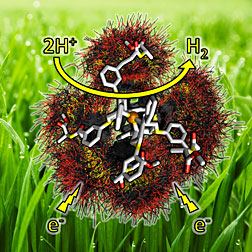- Number 385 |
- April 1, 2013
Adding natural elements to synthetic catalysts speeds hydrogen production

Scientists at Pacific Northwest National
Laboratory showed that adding a
carbon-nitrogen bond in just the right spot
on the catalyst's outer edge can cause
the catalyst to work far faster.
By grafting features analogous to those in Mother Nature's catalysts onto a synthetic catalyst, scientists at DOE's Pacific Northwest National Laboratory created a hydrogen production catalyst that is 40% faster than the unmodified catalyst. The team discovered that adding small molecules made from amino acids in the outer coordination sphere increased the speed without requiring additional energy to drive the catalyst. The outer coordination sphere is part of the catalyst's scaffolding. It creates channels used by electrons and protons to reach the heart of the catalyst, where the reaction occurs. This study graces the cover of Chemistry: A European Journal.
To build energy storage for wind farms, long-lasting electric car batteries, and new affordable fuels, scientists must create never-before-seen catalysts that are both fast and durable. These catalysts must be based on earth-abundant metals, like nickel and iron. This study provides foundational information that could, one day, help design and synthesize these catalysts.
"To get the catalysts to achieve their full potential, we need to understand how to get them to overcome their limitations," said Dr. Wendy Shaw, a biophysical chemist at PNNL.
Resources in DOE's EMSL, a national scientific user facility at PNNL, were used. This work was funded by DOE's Basic Energy Sciences (BES) Physical Bioscience program, Chemical Sciences, Geosciences, and Biosciences Division, Office of Science Early Career Research Program and the Center for Molecular Electrocatalysis, an Energy Frontier Research Center.[Kristin Manke, 509.372.6011,
kristin.manke@pnl.gov]
